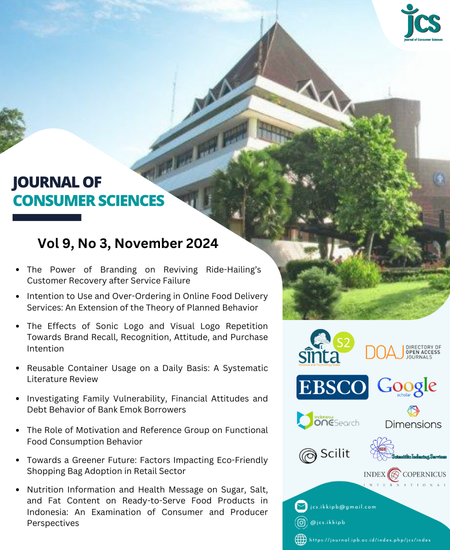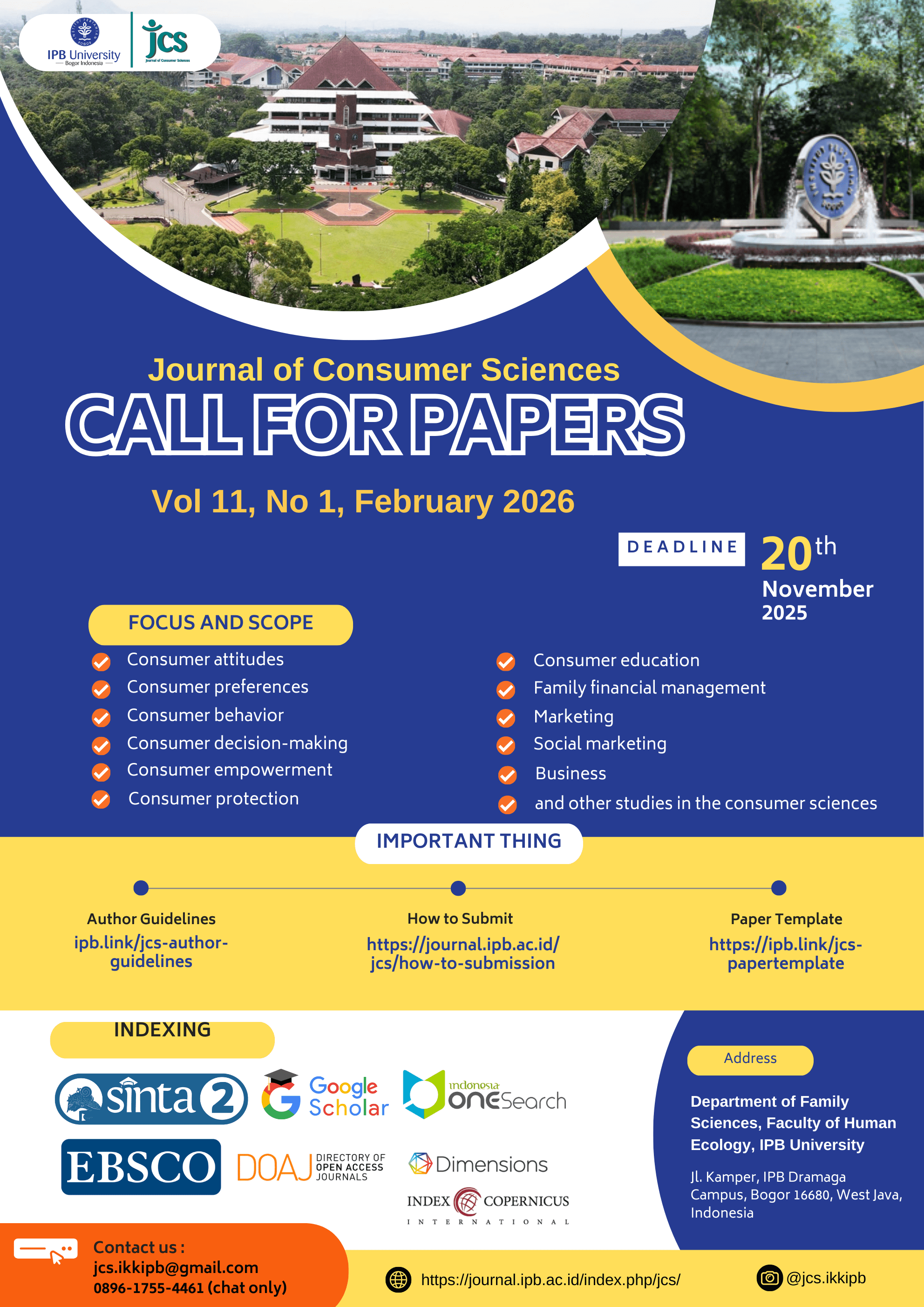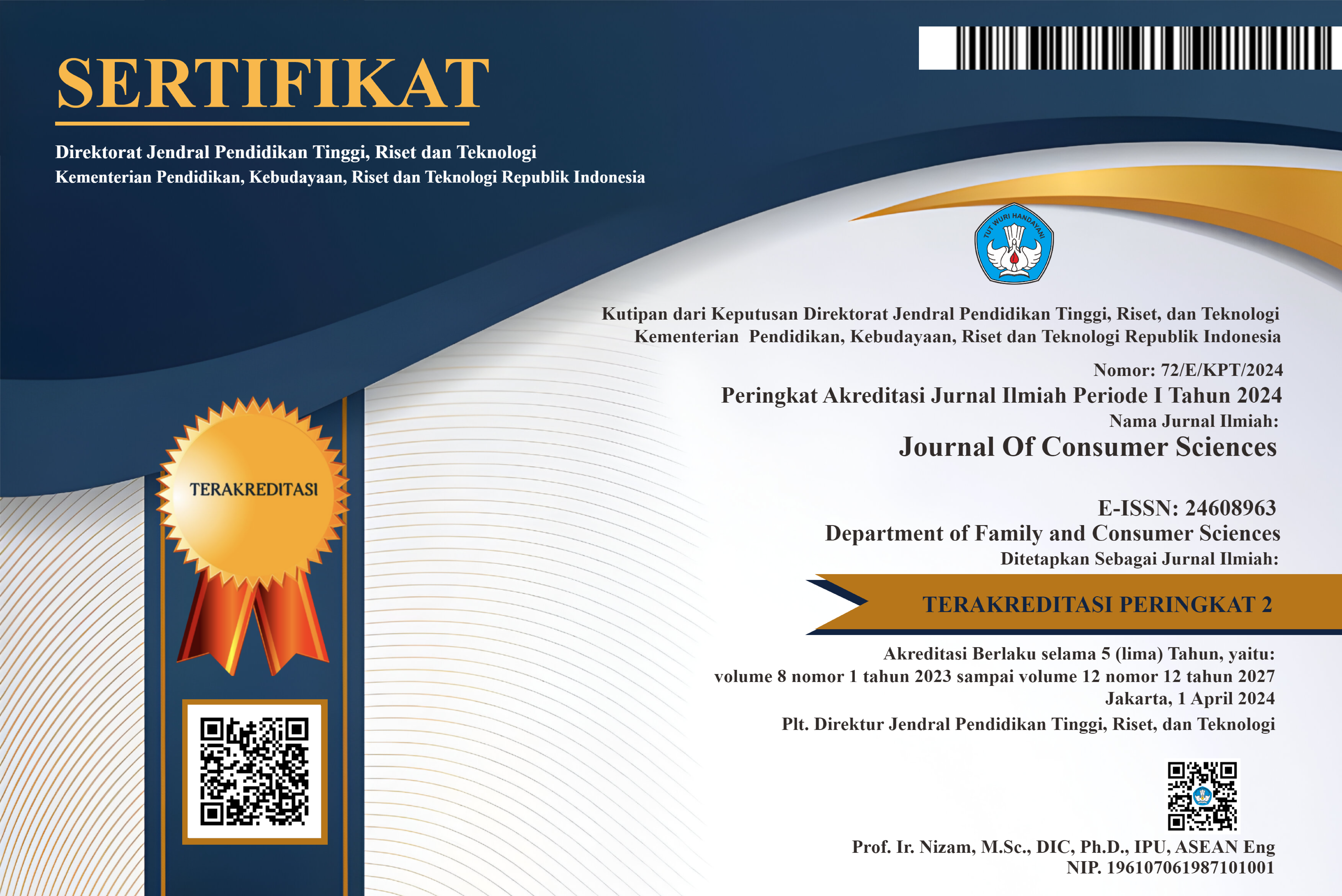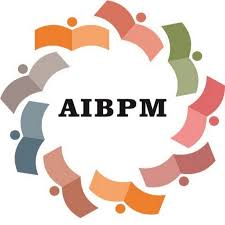The Effects of Sonic Logo and Visual Logo Repetition Towards Brand Recall, Recognition, Attitude, and Purchase Intention
DOI:
https://doi.org/10.29244/jcs.9.3.338-361Keywords:
attitude towards the brand, brand recall, brand recognition, purchase intention, repetition, sensory marketingAbstract
Most Indonesian e-commerce brands use sensory marketing, such as repetition of sonic logos and visual logos, in their advertisements. This research investigates the impact of repeated exposure to sonic logo and visual logos in advertisements on brand recall, brand recognition, attitudes toward the brand, and purchase intention. This study employed an experimental design with three repetition levels: one, three, and seven repetitions. The sample comprises individuals from the target market of Indonesian e-commerce platforms, selected through probability random sampling. The total sample is 300, with 100 participants in each group. The hypotheses were tested using one-way analysis of variance (ANOVA) to determine the significance of differences between groups. The results indicate that the repetition of sonic logo and visual logos in advertisements significantly enhances brand recall and recognition, positively influences attitudes toward the brand, and increases purchase intention. Industry players are advised to use sonic logos and visual logo repetition considering its significant effect on a brand. The recommended number of repetitions is three times to assess the effect of changes in the brand. Although additional repetitions beyond three may further enhance these effects, the incremental benefit diminishes.
References
Aaker, D. A. (1991). Managing Brand Equity: Capitalizing on The Value of a Brand Name. Free Press. https://doi.org/10.1016/0148-2963%2894%2990009-4
Ayada, W., & Ragab, D. (2024). The role of sonic logos in enhancing brand recall and recognition. International Design Journal, 14(2), 439–447. https://doi.org/10.21608/idj.2024.340785
Barrio Fraile, E., Enrique Jiménez, A. M., Barbeito Veloso, M. L., & Fajula Payet, A. (2021). Sonic identity and audio branding elements in Spanish radio advertising. Anàlisi, 65, 103–119. https://doi.org/10.5565/rev/analisi.3330
Bergkvist, L., & Taylor, C. R. (2022). Reviving and improving brand awareness as a construct in advertising research. Journal of Advertising, 51(3), 294–307. https://doi.org/10.1080/00913367.2022.2039886
Berlyne, D. E. (1970). Novelty, complexity, and hedonic value. Perception & Psychophysics, 8(5), 279–286. https://doi.org/10.3758/BF03212593
Bresciani, S., & Del Ponte, P. (2017). New brand logo design: Customers’ preference for brand name and icon. Journal of Brand Management, 24(5), 375–390. https://doi.org/10.1057/s41262-017-0046-4
Catalán, S., Martínez, E., & Wallace, E. (2019). Analysing mobile advergaming effectiveness: The role of flow, game repetition and brand familiarity. Journal of Product & Brand Management, 28(4), 502–514. https://doi.org/10.1108/JPBM-07-2018-1929
Chen, Y. S. A., & Bei, L. T. (2020). The effects of logo frame design on brand extensions. Journal of Product & Brand Management, 29(1), 97–113. https://doi.org/10.1108/JPBM-12-2017-1698
Databoks. (2024, October 10). E-commerce dengan pengunjung terbanyak sepanjang 2023. katadata.co.id. https://databoks.katadata.co.id/teknologi-telekomunikasi/statistik/3c9132bd3836eff/5-e-commerce-dengan-pengunjung-terbanyak-sepanjang-2023
Foroudi, P., Foroudi, M. M., Nguyen, B., & Gupta, S. (2019). Conceptualizing and managing corporate logo: A qualitative study. Qualitative Market Research: An International Journal, 22(3), 381–404. https://doi.org/10.1108/QMR-04-2017-0080
Ghosh, T., Sreejesh, S., & Dwivedi, Y. K. (2022). Brand logos versus brand names: A comparison of the memory effects of textual and pictorial brand elements placed in computer games. Journal of Business Research, 147, 222–235. https://doi.org/10.1016/j.jbusres.2022.04.017
GoodStats. (2023, December 1). Daftar e-commerce dengan nilai transaksi terbesar di indonesia. GoodStats. goodstats. https://goodstats.id/infographic/daftar-e-commerce-dengan-nilai-transaksi-terbesar-di-indonesia-M20kO
Griffith, D. A., & Chen, Q. (2004). The influence of virtual direct experience (Vde) on on-line ad message effectiveness. Journal of Advertising, 33(1), 55–68. https://doi.org/10.1080/00913367.2004.10639153
Henderson, P. W., & Cote, J. A. (1998). Guidelines for selecting or modifying logos. Journal of Marketing, 62(2), 14–30. https://doi.org/10.1177/002224299806200202
Holbrook, M. B., & Batra, R. (1987). Assessing the role of emotions as mediators of consumer responses to advertising. Journal of Consumer Research, 14(3), 404. https://doi.org/10.1086/209123
Hong, Y. J., Choi, B., & Lee, K. (2023). When background music in audiovisual advertisements can boost the perceived competence of the advertised brands – an empirical study from South Korea. Asia Pacific Journal of Marketing and Logistics, 35(8), 1991–2011. https://doi.org/10.1108/APJML-03-2022-0275
Hutabarat, P. M., & Adelina, E. (2023). Sensory marketing for the omnichannel consumer experience: Benefits and ways forward. Proceedings of the International Conference on Vocational Education Applied Science and Technology (ICVEAST 2023), 783, 655–665. https://doi.org/10.2991/978-2-38476-132-6_56
Imen, T. (2013). The length effect, the repetition frequency effect and the moment effect of the passage of the product or of the brand during a television spot on the advertising message (Tunisian frame). Journal of Marketing Research and Case Studies, 1–27. https://doi.org/10.5171/2013.667225
Itasari, A. A., & Hastuti, N. H. (2023). The effect of advertisement, word of mouth, and brand awareness towards buying decision on" Ruang Guru Apps" in SMU Negeri XYZ Surakarta. Journal of Consumer Sciences, 8(2), 155-169. https://doi.org/10.29244/jcs.8.2.155-169
Rahmah, K., & Satyaninggrat, L. M. W. (2023). The the effect of consumer characteristics and lifestyle toward purchase decision. Journal of Consumer Sciences, 8(3), 395–413. https://doi.org/10.29244/jcs.8.3.395-413
Khuong, M. N., & Nguyen, T. D. (2015). The effects of television commercials on customers purchase intention – a study of milk industry in Ho Chi Minh City, Vietnam. Journal of Economics, Business and Management, 3(9). https://doi.org/10.7763/JOEBM.2015.V3.297
Kim, Y., & Leng, H. K. (2017). Effectiveness of in-game advertisement: An examination of repetition effect, brand familiarity and the relationship between gaming skills and advertising execution. Journal of Global Sport Management, 2(1), 42–64. https://doi.org/10.1080/24704067.2017.1281714
Krishnan, V., Kellaris, J. J., & Aurand, T. W. (2012). sonic logos: Can sound influence willingness to pay?. Journal of Product & Brand Management, 21(4), 275–284. https://doi.org/10.1108/10610421211246685
Li, H., Xu, J., Fang, M., Tang, L., & Pan, Y. (2023). A study and analysis of the relationship between visual—Auditory logos and consumer behavior. Behavioral Sciences, 13(7), 613. https://doi.org/10.3390/bs13070613
Marketeers. (2017, December 28). Inilah e-Commerce yang paling banyak dikunjungi di 2017. Marketeers. https://www.marketeers.com/e-commerce-paling-banyak-dikunjungi/
Martí-Parreño, J., Bermejo-Berros, J., & Aldás-Manzano, J. (2017). Product placement in video games: The effect of brand familiarity and repetition on consumers’ memory. Journal of Interactive Marketing, 38, 55–63. https://doi.org/10.1016/j.intmar.2016.12.001
Memon, B. (2016). Impact of brand recall on customer purchase intention. Journal of Marketing and Consumer Research, 25, 1-9. https://ssrn.com/abstract=2913547
Morton, C. R., & Friedman, M. (2002). “I saw it in the movies”: Exploring the link between product placement beliefs and reported usage behavior. Journal of Current Issues & Research in Advertising, 24(2), 33–40. https://doi.org/10.1080/10641734.2002.10505133
Mukherjee, K., & Banerjee, N. (2019). Social networking sites and customers’ attitude towards advertisements. Journal of Research in Interactive Marketing, 13(4), 477–491. https://doi.org/10.1108/JRIM-06-2018-0081
Peng, L., Wei, Y., Zhang, X., & Wang, D. (2024). Flatness promotes modernity: Logo flatness and consumers’ perception of brand image. Asia Pacific Journal of Marketing and Logistics, 36(2), 315–333. https://doi.org/10.1108/APJML-02-2023-0111
Pesovski, I., Kulakov, A., & Trajkovik, V. (2022). Cognitive ability test scores between generations. The 19th International Journals on Informatics and Information Technologies – CIIT 2022, 25-30. https://doi.org/20.500.12188/25674
Puligadda, S., & VanBergen, N. (2023). The influence of sound logo instruments on brand personality perceptions: An investigation of brand ruggedness and sophistication. Journal of Business Research, 156, 113531. https://doi.org/10.1016/j.jbusres.2022.113531
Santiago, J. K., & Su, X. (2023). Can a vlogger help to build brand awareness? The impact of vloggers on customers’ attitude towards brand advertisement and purchase intention. Journal of Intercultural Management, 15(1), 4–40. https://doi.org/10.2478/joim-2023-0001
Scott, S. P., Sheinin, D., & Labrecque, L. I. (2022). Small sounds, big impact: sonic logos and their effect on consumer attitudes, emotions, brands and advertising placement. Journal of Product & Brand Management, 31(7), 1091–1103. https://doi.org/10.1108/JPBM-06-2021-3507
Shams, L., Kamitani, Y., & Shimojo, S. (2000). What you see is what you hear. Nature, 408(6814), 788–788. https://doi.org/10.1038/35048669
Song, J. (Flora), Xu, F. (Katie), & Jiang, Y. (2022). The colorful company: Effects of brand logo colorfulness on consumer judgments. Psychology & Marketing, 39(8), 1610–1620. https://doi.org/10.1002/mar.21674
Sriram, K. V., Namitha, K.P., Kamath, G. B., & Villace, T (2021). Social media advertisements and their influence on consumer purchase intention. Cogent Business & Management, 8(1), 2000697. https://doi.org/10.1080/23311975.2021.2000697
Steinhart, Y., Kamins, M., Mazursky, D. and Noy, A. (2014). Effects of product type and contextual cues on naive theories of popularity and exclusivity. Journal of Consumer Psychology, 24(4), 472–483. https://doi.org/10.1016/j.jcps.2014.04.004
Techawachirakul, M., Pathak, A., Motoki, K., & Anne Calvert, G. (2023). sonic logo branding of meat- and plant-based foods: The role of timbre. Journal of Business Research, 165, 114032. https://doi.org/10.1016/j.jbusres.2023.114032
Torbarina, M., Čop, N. G., & Jelenc, L. (2021). Logo shape and color as drivers of change in brand evaluation and recognition. Naše Gospodarstvo/Our Economy, 67(1), 33–45. https://doi.org/10.2478/ngoe-2021-0004
Ugalde, C., Küster, I., & Vila, N. (2024). Brand attachment: The moderating effect of high and low involvement products. Journal of Consumer Sciences, 9(2), 185–205. https://doi.org/10.29244/jcs.9.2.185-205
Vidal-Mestre, M., Freire-Sánchez, A., Calderón-Garrido, D., Faure-Carvallo, A., & Gustems-Carnicer, J. (2022). Audio identity in branding and brand communication strategy: A systematic review of the literature on audio branding. El Profesional de La Información, e310504. https://doi.org/10.3145/epi.2022.sep.04
Yoo, C. S., Sankaran, R., & Chen, J. H. (2009). Three-dimensional direct numerical simulation of a turbulent lifted hydrogen jet flame in heated coflow: flame stabilization and structure. Journal of Fluid Mechanics, 640, 453-481. https://doi.org/10.1017/S0022112009991388
Downloads
Published
Issue
Section
License
Authors who publish with this journal agree to the following terms:
- Authors retain copyright and grant the journal right of first publication with the work simultaneously licensed under a

This work is licensed under a Creative Commons Attribution 4.0 International License. that allows others to share the work with an acknowledgement of the work's authorship and initial publication in this journal. - Authors are able to enter into separate, additional contractual arrangements for the non-exclusive distribution of the journal's published version of the work (e.g., post it to an institutional repository or publish it in a book), with an acknowledgement of its initial publication in this journal.
- Authors are permitted and encouraged to post their work online (e.g., in institutional repositories or on their website) prior to and during the submission process, as it can lead to productive exchanges, as well as earlier and greater citation of published work (See The Effect of Open Access).

















